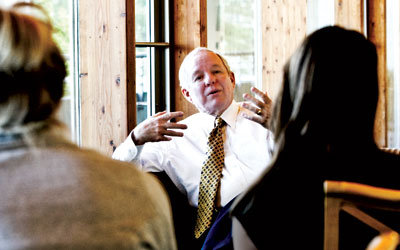 |
|
Summer 2009 | Volume 32, Number 2
| From the President
|
|
|
The Biblical Imagination and the Economy
“I believe we’re called to imagine a new world”

Re-imagining our world in the midst of a recession was a topic of conversation for President Eaton and others on campus throughout the last year.
“Nobody knows. Nobody knows. Nobody knows.” This was the answer, from a smart, savvy friend of mine, to the question of where the bottom is and what the solutions are to this awful economic freefall that seems to drag us down so painfully.
He said he was quoting lyrics from an old song out of his era. But because Seattle Pacific University has leaned on investment advice from this gracious, insightful friend for so many years, I was waiting for the next shoe to drop, this one with a definitive thump of certainty. But he stopped talking.
“Nobody knows” — this was his final answer.
Will the stimulus package help to resuscitate the economy? Will our credit resources stabilize soon to provide the lifeblood for new growth once again? Do people have enough faith in American business to keep their retirement hopes in the stock market? If not, where else do we turn? How soon will jobs feel secure again? How soon will opportunities blossom again for the entrepreneurial, creative spirits among us? How long will it take? Maybe that’s the biggest question on everyone’s mind these days. Is it different this time around?
Nobody knows. What a humbling and frightening response to all of this.
I have been doing a lot of thinking about what might be permanent about the changes we have been experiencing in our lives. Might there be permanent changes in the way our businesses do business into the future, perhaps forcing us into more transparency, openness, and honesty? Perhaps we will save more money, on a permanent basis, as individuals and as a country? Perhaps we will cut back on lavish and leveraged spending, adjusting down our expectations for our standards of living? Perhaps stratospheric, obscene salaries for executives and athletes will come down permanently? Perhaps unrestrained consumption in every corner of our society, including government waste, will change permanently? All of this seems impossible, quite idealistic, but maybe fear will be great enough to force such permanent change?
The question for me at this moment is whether we can be truly thoughtful about what those changes will be, both for our individual lives, for the life of our organizations, and for our common life across our country and the globe. Is it possible to begin thinking carefully about reorienting our priorities, to actually make some wise choices about these things?
And then here is the follow-on question as we do our work at Seattle Pacific: Is it possible that we might begin to catch a glimpse of new hope for the human community, not just in terms of economic prosperity, but in the larger terms of genuine human flourishing? And here is another exceedingly important question: Is it possible that we might equip our students with a vision for a new kind of human community?
My answer to these questions just can’t be “nobody knows,” can it?
The great Old Testament scholar Walter Brueggemann talks about activating the biblical imagination in times like these. When we feel we are boxed in by “fixed conclusions,” those easy answers that are no longer working, it may be time, says Brueggemann, to lean on the great prophetic voices out of our ancient biblical tradition for a way of imagining a different future.
Maybe, says Brueggemann, we can discover, through the biblical imagination, a glimpse of a new kind of human flourishing. Maybe, in this time especially, we can open anew to those great prophetic voices, the ones that “not only discerned the new actions of God that others did not discern,” but voices that actually “wrought the new actions of God by the power of their imagination, their tongues, their words. New poetic imagination evoked new realities in the community.”
Is it possible for us to align ourselves to this kind of voice? Should we not be educating our students from this kind of deep resource for new vision? I think this is precisely our task, as a Christian university, for this moment in time.
And what does such a new notion of human community look like? Brueggemann says that the biblical vision creates an “anticipation of the restoration of public life, safe cities, caring communities, and secure streets. … There is anticipation of the restoration of personal and interpersonal life, happy families, domestic well-being and joy, shared food and delighted relationships. Both public and interpersonal life depend on the self-giving action of God who makes newness possible.”
I know all of this needs to become more concrete as we do our work as a university day in and day out. But at least we can continue to anchor our work with a vision of the way things ought to be. And at least the biblical imagination gives us the contours of a new human community where all of God’s children might flourish.
We find in the biblical imagination a set of priorities to begin to make our decisions about how we educate for such a time as this. This is a vision of human flourishing we want to pass on to our students. And then we’ve got to gather ourselves around the task of equipping our students with the very tools that will be needed to build such a future.
This is the work of the Christian university for this moment. Maybe, in this way, we can begin to penetrate the fog where “nobody knows.”
—By Philip W. Eaton
Return to top
Back to From the President Home
|
| |
|
 |
|
 |